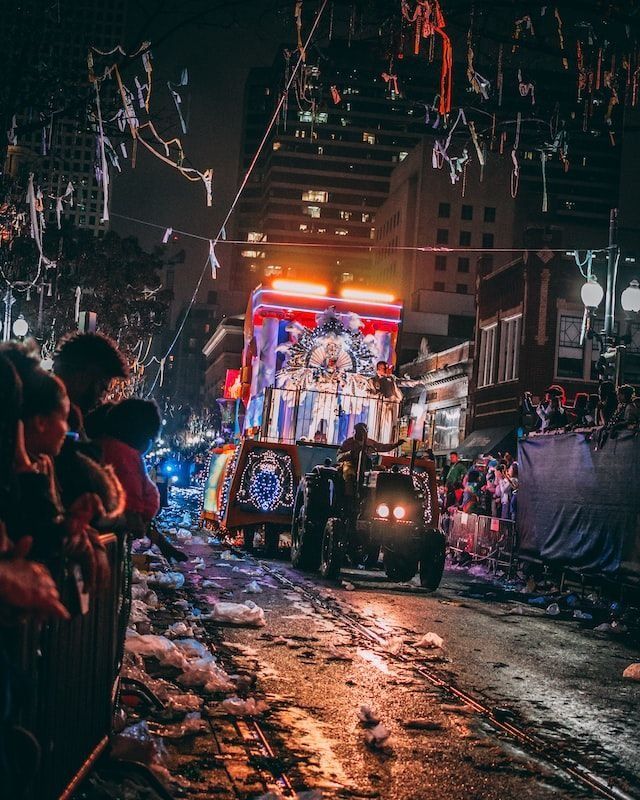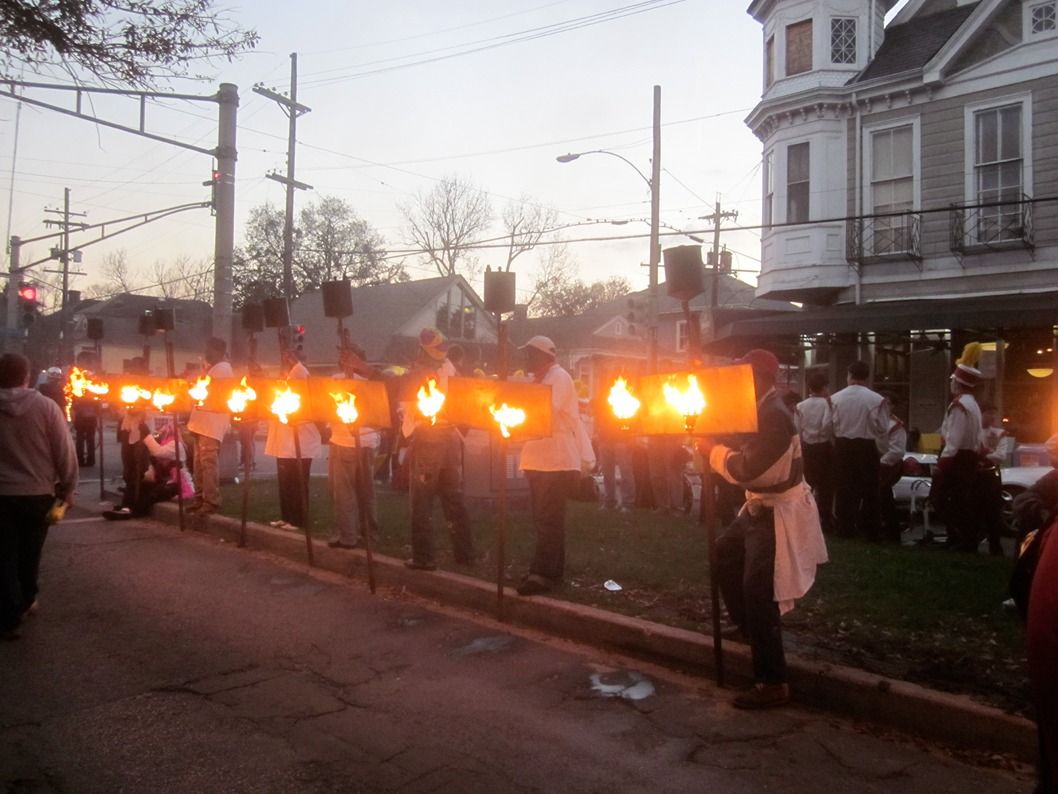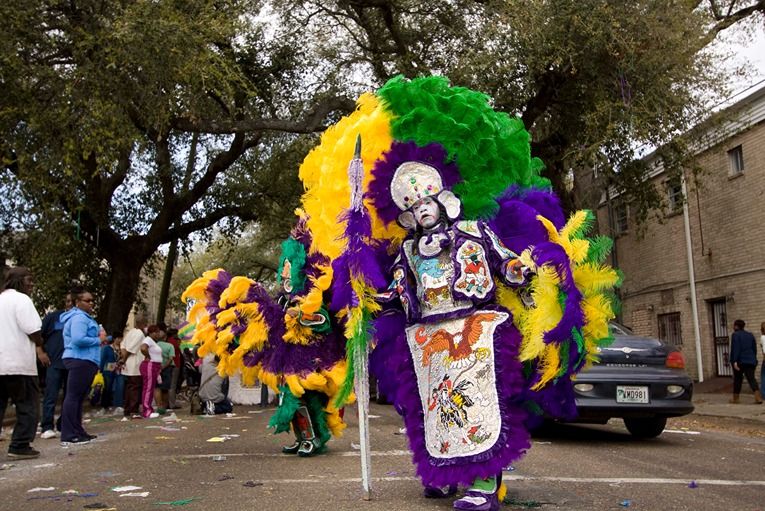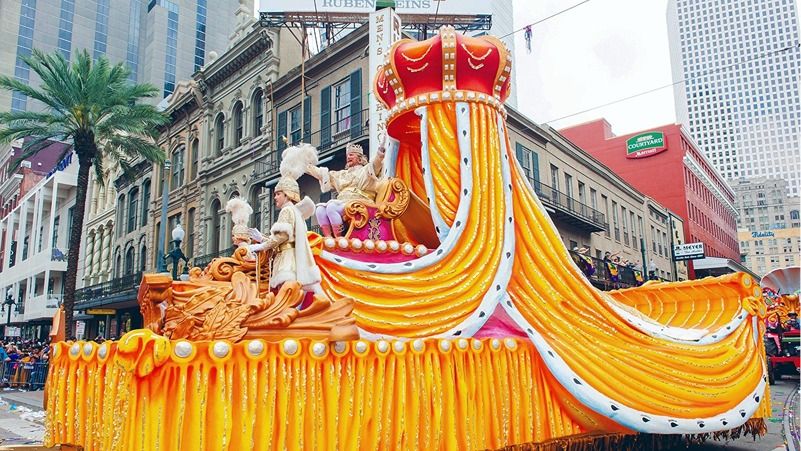Be in the Know With These Mardi Gras Words
New Orleans is a one-of-a-kind city that proudly boasts a unique history, culture, cuisine, and even dialect. Visitors to the city will quickly notice that the "Yat" dialect is unlike anything else they'll hear in the Deep South. New Orleanians have unique words for all kinds of things like po-boys and lagniappe, and that includes special terms for the city's favorite holiday: Mardi Gras. If you are new to Mardi Gras, you'll need to know the lingo. Here is a list of common Carnival terms.
Glossary of Mardi Gras Terms
Ball: a Mardi Gras ball is a special event parades host prior to rolling. They are similar to galas and often feature presentations of the royal court, dancing and costumes.
Bacchus: a parade that rolls the Sunday before Mardi Gras. It's named after the Greek god of wine, often featuring grape related throws. Many parades are named after ancient gods. It's considered a super krewe due to its size and celebrity guests.
Boeuf Gras: means "fat ox" in French. It's an ancient tradition of fattening a cow or ox for the town to eat before abstaining from meat during Lent.

Carnival: a Latin word that translates to "a farewell to meat." Carnival refers to the Mardi Gras season as a whole, beginning on King's Day and ending on Ash Wednesday.
Doubloon: a common Mardi Gras throw. They are large coins, usually made out of aluminum and painted flashy colors. Doubloons are perfect for collecting.
Endymion: a major parade or super krewe that takes place on Samedi Gras. The parade features a celebrity grand marshal, exuberant floats and lots of throws. It's named after a character from Greek mythology, cited as a shepherd, hunter or king.
Epiphany: a Christian feast day on January 6. The holiday celebrates the three wise men's visit to the baby Jesus. This is considered the official beginning to Carnival season and when king cakes become widely available in the city.

Flambeaux: comes from the French word for "flame." Before the days of electricity, slaves or free men of color would carry these large torches in parades to provide light and warmth.
King Cake: a festive cake made of Danish dough, cinnamon, glaze topping, colorful sprinkles, complete with a plastic baby figurine. The baby is meant to represent Jesus and commemorates the Christian holiday Epiphany.
Krewe: the group of people who ride in, create, fund and execute parades. The first use of the term is believed to be by the Mistick Krewe of Comus in the beginning of the 19th century.
Laissez Les Bons Temps Rouler: a Cajun French saying that means "let the good times roll." It's become a mantra of Mardi Gras throughout the years.
Lundi Gras: yet another French term that means "Fat Monday." It's the day before Mardi Gras (Fat Tuesday). The name didn't achieve popularity until the late 1980s. It originally celebrated the arrival of the king of Rex by boat, kicking off Mardi Gras.

Mardi Gras Indians: refers to African Americans who dress in Native American regalia such as headdresses and elaborate suits, adorned with feathers and beads. These secretive tribes march in parades, but never announce when beforehand. Allegedly, the practice is meant to pay tribute to the Native Americans who helped out slaves who fled to New Orleans.
Masquerade: a medieval tradition that incorporates masks, dancing and royalty. Masquerade balls have become commonplace during Carnival and masks have become synonymous to Mardi Gras.
Moon Pie: a dessert sandwich made of chocolate, graham crackers and marshmallows. They became a common throw during the 1950s.
Neutral Ground: the median that separates roads, usually planted with grass. Parade goers often distinguish where they will stand between the neutral ground side and the sidewalk side.

Rex: one of the most renowned parades. It's held on Mardi Gras day and has rolled more than any other parade in New Orleans' history. Rex is a Latin word that translates to "king."
Royal Court: refers to honored members of a krewe. This usually includes a king, queen, grand marshals, dukes, maids and more. Court members are often presented during the parade's ball in an elaborate fashion. These are coveted positions, and there are often years-long waiting lists to become a king or queen.
Super Krewe: a large-scale parade that features modern technology like fiber optic lights and animatronics, celebrity guests and lavish throws. The official super krewe parades are Endymion, Bacchus and Orpheus.
Throws: the materials riders throw to parade watchers. Beads, cups, doubloons, boas, stuffed animals, food and toys are common throws.
Zulu: also known as Zulu Social Aid & Pleasure Club is a well-known, historically African American Mardi Gras day parade. Its origins can be traced back to the early 1900s when it was a benevolent aid society. Its signature throws are hand-decorated coconuts.
They All Ask'd for These Mardi Gras Terms
Carnival season is a very important time for the City of New Orleans. People from all over the world come to NOLA the see and take part in the Mardi Gras festivities. So the next time you come to New Orleans, these special Mardi Gras terms will help you to familiarize yourself with our unique holiday. Catch plenty of throws and let the good times roll!

